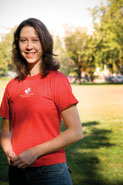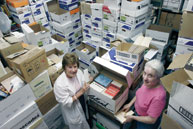In focus
Maryse Bourgault: Thinking locally, acting globally
Looking back, grad student Maryse Bourgault is convinced that Bagbusters was a great idea, but whose time wasn't ripe. Now, with five years and a BSc in environmental studies under her belt, it's time to get it going again.

Just how much water does a legume need? Ask Maryse Bourgault.
Claudio Calligaris
The organization, which she helped start at McGill back in her undergrad days, wants consumers to think a little bit about how many plastic bags they use a day, and if they really need all of them. Bourgault is urging consumers to consider greener options, like bringing their own bags with them on their shopping expeditions. To help, Bagbusters came up with their own bags, which they sold below cost, thanks to funding from the Students' Society of McGill University. The initial attempt lasted only a couple of years, she says, as many of the students who founded it - including herself - went abroad to pursue their research. In its reincarnated form, she's hoping for something a bit more durable.
"We want to create a network of Bagbusters at other universities, and get things like stickers and information tables to get awareness out there," says Bourgault.
Bagbusters is just one of Bourgault's many occupations. Besides being the secretary of Macdonald Campus' grad student society, pursuing her PhD in plant science (her thesis will focus on drought tolerance among legumes) and doing research at the Macdonald-Campus Brace Centre for Water Resource Management, she's part of the maintenance committee of her co-op.
Her social action hasn't gone unnoticed. She was up for this year's Forces Avenir award for Recognizing and Promoting Student Commitment in the graduate student category. Forces Avenir is a Quebec organization that recognizes bright, community-minded students at 17 universities across the province, and they gave her a nod for her commitment to improving the lives of farmers in impoverished areas by developing new farming techniques and her involvement in Honduras as coordinator of a natural medicine program. She didn't win, but she says she was flattered simply to be nominated.
The 26-year-old downtown resident has travelled widely for her research: her studies have taken her from Panama (where she helped set up an organic garden) to Uzbekistan (where she worked on ways to cultivate vegetable farming under poor soil conditions). She went to the remote ex-Soviet central Asian country twice for her PhD research, in 2003 and 2004. It gave her, she says, a glimpse of what can happen when you couple poor water management with corruption and an incompetently planned economy. Witness, for example, the Aral Sea. Once the fourth biggest inland sea in the world, it is now largely desert, as Soviet authorities diverted two of its main tributaries to feed massive cotton plantations in the 1960s.
"It was just the weirdest place I've ever been to," says Bourgault, her voice dropping. "We'd come to Muynak, the main port, and there'd be these ships just lying in the dust. You can't even see the water anymore."
Uzbekistan provided fertile ground for Bourgault's research, as well as an eye-opener for a subject she thinks will be increasingly important in the future. "With climate change, we're going to see more and more arid areas, and while there has been a lot of research on its effects, there hasn't been a lot of research done on the crop side," she says. "There's still a lot to do, and especially for legumes, because they are not very drought resistant, but they are an important source of protein for a lot of poor people who aren't able to buy meat."
Don't expect her to rest on any laurels. She hopes to complete her grad studies by 2007, and then continue her research, possibly in Mexico or Australia, or perhaps the Middle East.
In the meantime, she's going to keep trying to convince shoppers to find alternatives to using plastic bags. "[The initiative] is going to start soon," she promises.
Annual book fair marks Women Associates' 100th birthday
As you browse through second-hand books at this year's Book Fair, stop a moment to journey through time: this year marks the 100th anniversary of its founder and co-organizer, the Women Associates of McGill.

Volunteers Anelia Wright and Myrna Cohen organize, stack and price books for the biggest bibliophile event of the year, the McGill Book Fair, taking place October 19 and 20.
Owen Egan
The Women Associates began in 1905 as a Ladies Auxiliary. Composed of the wives of McGill staff, they held popular "College Teas." In 1914, reorganizing as the McGill Women's Union, they performed war work for the military units connected with McGill and sent letters to wounded men. In 1939, they knitted and sewed outfits for refugee families, military bandages and hospital sheets. Their current name dates from 1933, when they were rebaptized the Women Associates of McGill - their "70th Anniversary" in 2003 was a celebration of this event.
Today, the Women Associates are struggling to maintain membership. "Society has evolved," says Lauretta Alexander, president. "Now the spouses of male staff often have their own careers." For this reason, in addition to female staff, retirees and wives of staff, anyone is now welcome to join. The organization hosts a variety of intellectual and cultural events and has bridge, book discussion, gourmet dinner and gardening groups.
Holly Jonas, a former president and longtime member, says part of their mandate is to help newcomers feel connected to the McGill family. "Often a new professor moves here from another city or country, and his wife doesn't work and is stuck at home in the suburbs. We want to break that isolation."
Their main activity, however, is to raise funds for scholarships and bursaries. In 1970, they organized the first McGill Book Fair. The McGill Women's Alumnae Association joined in shortly after, and the annual event has since raised over $1.2 million.
Volunteers work year-round collecting boxes and bags of books from depots scattered across the city. Books are sorted into 30 categories, ranging from art history to medicine. Over 1,000 cartons of books now fill Redpath Hall.
"There are a lot of children's books this year, and a lot of good reads in fiction. People can stock up for the winter," says Shirley Baird of the Alumnae Association. "It's a win-win situation: people come away with books they love and students get scholarships and bursaries."
The McGill Book Fair runs Wednesday, October 19 and Thursday, October 20, from 9 am to 9 pm at Redpath Hall. Admission is free. Books start at 25 cents apiece. Cash only accepted.

